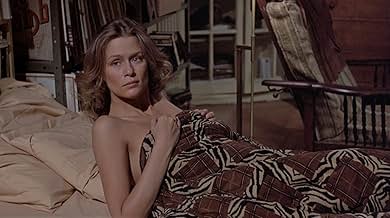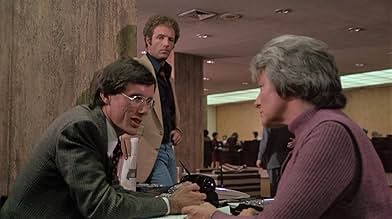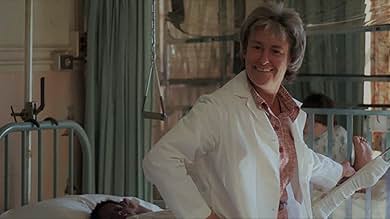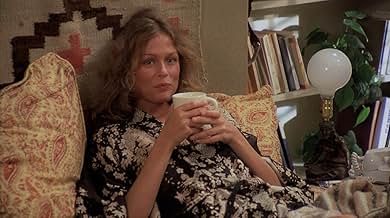AVALIAÇÃO DA IMDb
7,1/10
7 mil
SUA AVALIAÇÃO
James Caan interpreta um jogador compulsivo que não consegue parar de apostar nem ganhar. Ele contrai uma dívida com a máfia de US$ 40 mil dólares, mas continua a adorar a emoção de dar um t... Ler tudoJames Caan interpreta um jogador compulsivo que não consegue parar de apostar nem ganhar. Ele contrai uma dívida com a máfia de US$ 40 mil dólares, mas continua a adorar a emoção de dar um tiro no escuro.James Caan interpreta um jogador compulsivo que não consegue parar de apostar nem ganhar. Ele contrai uma dívida com a máfia de US$ 40 mil dólares, mas continua a adorar a emoção de dar um tiro no escuro.
- Direção
- Roteirista
- Artistas
- Prêmios
- 1 indicação no total
Avaliações em destaque
I saw this movie back in 1974/75 when it was released. I was already a Caan man. My comments are just random tidbits. Burt Young would go on to join Caan in 1975's The Killer Elite". Monkey (London Lee) was a stand-up comic who appeared numerous times on the Ed Sullivan show in the 60's. Lauren Hutton would trade Caan for Burt Reynolds in Gator. Caan earlier had beat out Burt for the role of Sonny Corleone. The line I remember most from this film is when Axel's mother is trying to get a bank loan to fund his gambling debt. There are some bureaucratic snafus and the bank officer isn't sure he has the proof to approve the loan to mom. Caan says "I came out of her womb and I know she's my mom. Now give her the god... money!".
I grew up amongst gamblers, spending much of my time hustling bowling and gin rummy throughout the Midwest, until, at 17, I shuffled off to the Ivy-covered walls of a prestigious Eastern College.
This gives me much simpatico with Axel Freed, the central character and portrait of self-destruction, the gambler, and James Toback, the film's author. Toback's own reflections suggest that Axel is in many ways auto-biographical.
As a film, The Gambler is shortsighted, an ambitious but nonetheless failed attempt by a first-time screenwriter in difficult waters. It is not without its brilliance-its relentless dedication toward conveying that any gambler's true goal is not success, but utter humiliation-destruction of one's self, and anything and anyone around him. It can be no other way.
In the 1990's where independent film has achieved an emergence and respect in its own, a film like this might have found the strength among the very talented people involved, (Toback, James Caan, Karel Reisz) to emerge into a true gem. Alas this 70's neglected studio cast-off didn't have that opportunity.
London Lee is great in support, Paul Sorvino and Burt Young are well cast as Freed's mob-ties. Young's performance as a mob leg-breaker includes quite a raw, and shocking collection scene.
Probably a pass for any but the gambling addict, for them, a head (as in tape-head) burner. For those who are intrigued by Toback's intelligent approach to the seedier side, try his next effort, Fingers (1978), a diamond in the rough.
This gives me much simpatico with Axel Freed, the central character and portrait of self-destruction, the gambler, and James Toback, the film's author. Toback's own reflections suggest that Axel is in many ways auto-biographical.
As a film, The Gambler is shortsighted, an ambitious but nonetheless failed attempt by a first-time screenwriter in difficult waters. It is not without its brilliance-its relentless dedication toward conveying that any gambler's true goal is not success, but utter humiliation-destruction of one's self, and anything and anyone around him. It can be no other way.
In the 1990's where independent film has achieved an emergence and respect in its own, a film like this might have found the strength among the very talented people involved, (Toback, James Caan, Karel Reisz) to emerge into a true gem. Alas this 70's neglected studio cast-off didn't have that opportunity.
London Lee is great in support, Paul Sorvino and Burt Young are well cast as Freed's mob-ties. Young's performance as a mob leg-breaker includes quite a raw, and shocking collection scene.
Probably a pass for any but the gambling addict, for them, a head (as in tape-head) burner. For those who are intrigued by Toback's intelligent approach to the seedier side, try his next effort, Fingers (1978), a diamond in the rough.
Just about everyone who has posted a reply about the shocking ending was simply left too much in the dark to realize that it tied together a different root demise of Axel Freed than gambling.
Just as a compulsive behavior leads to compulsive gambling, the root evil of Axel Freed was that he had a masochist behavior. When you look a little closer at all the scenes where he acts out this kind of behavior, it makes more sense. The problem lies in that the casual observer is only looking at the problem gambling aspect. There is more to this guy than just that.
The ways he handles his relationships with his mother, girlfriend, grandfather and feelings at the end towards the basketball player ALL indicate there is masochist behavior involved. These are more than just selfish acts. There is some actual self hatred going on as well. Without giving away the final scene, this scene further accentuates the point by sending himself into that situation. The final scene was a conscious act, not something resulting from random chance or risk.
So despite the movie having some gambling theme to it, this really wasn't necessarily about gambling addiction. It was about the nature of Axel Freed. If the movie had no gambling scenes in it at all this point would be more readily identifiable.
The only real oddity in the final scene is the placement of the final scene. If this scene was placed somewhere in the middle of the movie, the underlying theme of his masochist pattern of behavior would have been more easily identified with. Because the movie started with a gambling scene, we all assumed it was just about gambling. Wrong!
Its a tricky concept to catch the first time. Watch this movie again with this concept in mind and the movie will make more sense.
Just as a compulsive behavior leads to compulsive gambling, the root evil of Axel Freed was that he had a masochist behavior. When you look a little closer at all the scenes where he acts out this kind of behavior, it makes more sense. The problem lies in that the casual observer is only looking at the problem gambling aspect. There is more to this guy than just that.
The ways he handles his relationships with his mother, girlfriend, grandfather and feelings at the end towards the basketball player ALL indicate there is masochist behavior involved. These are more than just selfish acts. There is some actual self hatred going on as well. Without giving away the final scene, this scene further accentuates the point by sending himself into that situation. The final scene was a conscious act, not something resulting from random chance or risk.
So despite the movie having some gambling theme to it, this really wasn't necessarily about gambling addiction. It was about the nature of Axel Freed. If the movie had no gambling scenes in it at all this point would be more readily identifiable.
The only real oddity in the final scene is the placement of the final scene. If this scene was placed somewhere in the middle of the movie, the underlying theme of his masochist pattern of behavior would have been more easily identified with. Because the movie started with a gambling scene, we all assumed it was just about gambling. Wrong!
Its a tricky concept to catch the first time. Watch this movie again with this concept in mind and the movie will make more sense.
This is a film that must be seen to be believed.
Caan is extraordinary; the emotional truth of this film penetrates each line, each scene...The most searing and intense and exact ending in modern film. The straight-forward telling of a professor with a gambling problem does not prepare one for the scale and price of betrayal and redemption of human emtions that are portrayed. A stunning film.
Caan is extraordinary; the emotional truth of this film penetrates each line, each scene...The most searing and intense and exact ending in modern film. The straight-forward telling of a professor with a gambling problem does not prepare one for the scale and price of betrayal and redemption of human emtions that are portrayed. A stunning film.
Sometimes he wins; but mostly he loses. Gambling is an addiction for Axel Freed (James Caan), a professor of English literature and lover of classical music. The film is set in New York City.
The object of the obsession can be almost anything on which a bet is placed: dice, cards, a basketball game, a college football match. It really doesn't matter. Axel just can't keep from making bets. He's like two different people. In a classroom setting, he is logical and intelligent. But when betting, he throws away the logic in favor of risk taking. In these situations he seems to lack the normal psychological "brakes" that could be applied to his destructive over-betting. In his own words: "I like the threat of losing". And always in the background are the thugs and the con men that lord over Axel, when he borrows to gamble, but can't pay his debt.
Some of Axel's classroom lectures have real thematic value. The ideas relate both to him, and incidentally to some modern-day politicians. For example, a person "... claims an idea is true because he wants it to be true, because he says it's true. And the issue isn't whether he's right, but whether he has the will to believe he's right, no matter how many proofs there are that say he's wrong". Axel continues: "D.H. Lawrence says Americans fear new experience more than they fear anything. They are the world's greatest dodgers, because they dodge their own very selves". Heavy stuff.
Despite a disappointing ending, "The Gambler" is an interesting character study of a personality type that is all too prevalent in modern society. The film's color cinematography is generally dark, in keeping with the film's theme. Overall acting is fine. Paul Sorvino gives an especially convincing performance, as does James Caan. The plot proceeds rather slowly.
Mostly, the film has terrific thematic value. It encourages the viewer to pause and reflect, to ponder, to question one's own motivations. That is a trait lacking in many current movies.
The object of the obsession can be almost anything on which a bet is placed: dice, cards, a basketball game, a college football match. It really doesn't matter. Axel just can't keep from making bets. He's like two different people. In a classroom setting, he is logical and intelligent. But when betting, he throws away the logic in favor of risk taking. In these situations he seems to lack the normal psychological "brakes" that could be applied to his destructive over-betting. In his own words: "I like the threat of losing". And always in the background are the thugs and the con men that lord over Axel, when he borrows to gamble, but can't pay his debt.
Some of Axel's classroom lectures have real thematic value. The ideas relate both to him, and incidentally to some modern-day politicians. For example, a person "... claims an idea is true because he wants it to be true, because he says it's true. And the issue isn't whether he's right, but whether he has the will to believe he's right, no matter how many proofs there are that say he's wrong". Axel continues: "D.H. Lawrence says Americans fear new experience more than they fear anything. They are the world's greatest dodgers, because they dodge their own very selves". Heavy stuff.
Despite a disappointing ending, "The Gambler" is an interesting character study of a personality type that is all too prevalent in modern society. The film's color cinematography is generally dark, in keeping with the film's theme. Overall acting is fine. Paul Sorvino gives an especially convincing performance, as does James Caan. The plot proceeds rather slowly.
Mostly, the film has terrific thematic value. It encourages the viewer to pause and reflect, to ponder, to question one's own motivations. That is a trait lacking in many current movies.
Você sabia?
- CuriosidadesAccording to James Toback, before his screenplay was accepted at Paramount Pictures, and was making the rounds with actors, Peter Boyle was first interested in playing the lead. Robert De Niro lobbied hard for the role, to the point where De Niro started to dress like the writer. Toback pressured director Karel Reisz to meet with De Niro. After meeting him, Reisz said that he would not, and could not consider De Niro for the role, and if Toback kept insisting, he would not be allowed to collaborate on the film further.
- Erros de gravaçãoAxel knocks the pimp's hat off on the second punch. It reappears on his head on the following one.
- ConexõesFeatured in WatchMojo: Top 10 Gambling Movies (2014)
- Trilhas sonorasSymphony No. 1 in D
Written by Gustav Mahler (as Mahler)
Performed by Koninklijk Concertgebouworkest (as The Concertgebouw Orchestra)
Conducted by Bernard Haitink (as Haitink)
Courtesy of Philips Records
Principais escolhas
Faça login para avaliar e ver a lista de recomendações personalizadas
- How long is The Gambler?Fornecido pela Alexa
Detalhes
Bilheteria
- Faturamento bruto nos EUA e Canadá
- US$ 1.305.782
- Tempo de duração
- 1 h 51 min(111 min)
- Mixagem de som
- Proporção
- 1.85 : 1
Contribua para esta página
Sugerir uma alteração ou adicionar conteúdo ausente

































